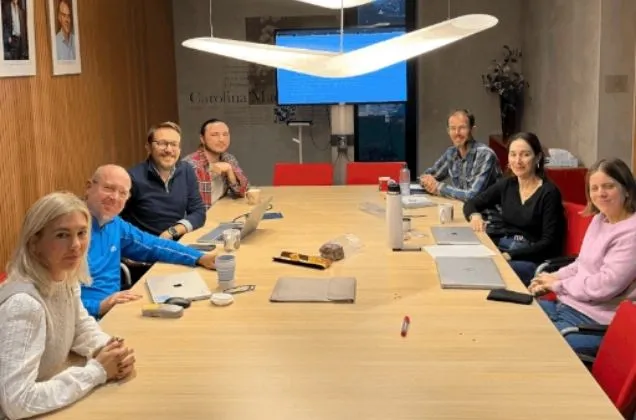07/02/2023
Focusing on the current issues of the global energy and climate agenda, Sabancı University Istanbul International Center for Energy and Climate (IICEC) addressed the world's challenging issues of energy crisis and renewable energy in a conference entitled "Global Energy Crisis: Solutions & The Role of Renewable Energy" held in Istanbul. The ways out of the energy crisis and the importance of renewable energy for a sustainable future were discussed at the conference and the launch presentation was made for the 'Turkey Renewable Energy Outlook 2022 Report' prepared by IICEC, which is a first in the sector, and a pioneering study.
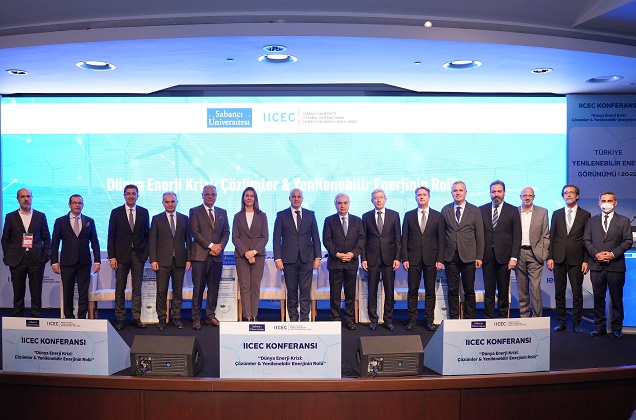
Güler Sabancı, the Founding Chair of the Sabancı University Board of Trustees, stated that she was very pleased to see IICEC expanding its work and sphere of influence within the ecosystem. She added, “In this perspective, IICEC is a leading model and center in Turkey. This year, within the scope of the Outlook series, it completed its first and pioneering work in the sector, focusing on renewable energy, one of Turkey's most important opportunity areas, and offering an analytical perspective, with a participatory approach involving industry stakeholders. From now on, Turkey will continue its efforts to pave the way for energy and climate policies and to guide decision-makers and all stakeholders”.
Dr. Fatih Birol, Executive Director of the International Energy Agency (IEA) and Honorary Chair of IICEC, emphasized that 2023 will be a much more difficult year due to the global energy crisis and that we may miss 2022. He continued, “The year 2022 has been extremely painful for many people, especially those living in Ukraine. In the future, in 2030, we will not only remember 2022 as a difficult and painful year, but also as a year in which clean energy technologies gained historical momentum”.
Pointing out that Turkey has made a huge leap in renewable energy in this process, Dr. Fatih Birol said, “We think that Turkey will grow by 65% in renewable energy in the next 5 years. This means entering the top 4 in Europe and the top 10 in the world”, highlighting that Turkey has a lot of potential in this field.
Making the launch presentation of the IICEC “Turkey Renewable Energy Outlook 2022 Report” at the conference, IICEC Director Bora Şekip Güray stated that they presented 7 concrete suggestions to all stakeholders in the report. Güray said, “According to our study, by 2050, the proportional contribution of renewable energy in electricity generation in Turkey may double, and the contribution of renewable energy in the total energy system may increase more than four times. We see that one unit of electricity investment increase will create ten units of savings in imported fossil fuel and emission costs”.
The energy crisis in the world and solutions to it, and the development of renewable energy in Turkey were discussed at a conference entitled "Global Energy Crisis: Solutions & The Role of Renewable Energy" organized by Sabancı University Istanbul International Center for Energy and Climate (IICEC) atSabancı Center.
A first and pioneering study in the sector on renewable energy from IICEC
The conference started with the opening speech delivered online by Güler Sabancı, the Founding Chair of the Sabancı University Board of Trustees. Dr. Fatih Birol, Executive Director of the International Energy Agency (IEA) and Honorary Chair of IICEC was the keynote speaker. Within the scope of the conference, the launch presentation of the "Turkey Renewable Energy Outlook 2022 Report", which is a first in the sector and a pioneering study, was made by IICEC Director Bora Şekip Güray.
In the panel held after the conference, business people evaluated the energy crisis in the world and the latest developments in the field of renewable energy in terms of the sector and companies.
Güler Sabancı: “IICEC will continue its guiding work”
Guler Sabancı emphasized that they listened to the latest developments and eye-opening perspectives in the field of energy and climate from Dr. Fatih Birol with the privilege of IICEC. She added the following:
“State leaders from US President Biden to French President Macron consult Dr. Fatih Birol on a continuous and regular basis for his assessments and recommendations on current energy and climate issues. With his leadership, Fatih Birol has made the International Energy Agency an organization that leads global energy and climate issues. We are very glad that he is also here as Honorary President of IICEC. I would like to thank him again for his support for the vision and development of IICEC.
“IICEC continues to bring stakeholders together to produce collective wisdom within the model I describe as the success triangle. We are in a time when we need collective wisdom in the world. I am very pleased to see that IICEC is expanding its work and sphere of influence within the ecosystem. Within the scope of its Outlook series, IICEC focused on renewable energy, which is one of the most important opportunity areas in Turkey this year. It completed its first and pioneering work in the sector, which offers an analytical perspective, with the stakeholders of the sector in a participatory manner. I would like to express my endless thanks to all the players of the sector who participated in this study, to the university, to our participants, and to the IICEC team who contributed a great deal. It is a very good catalog and book. From now on, IICEC will continue its efforts to pave the way for Turkey's energy and climate policies and to guide decision-makers and all stakeholders.
“At Sabancı University, we attach great importance to creating value from science-based approaches and business collaborations. In this perspective, IICEC is a leading model and center in Turkey”.
“In 2023, we may even miss the year 2022”
Dr. Fatih Birol, on the other hand, reminded us that in order to look at the current energy crisis in the world it is necessary to look first at February 24, the day when Russia invaded Ukraine, and continued as follows:
“There were oil crises in the 1970s, but today we are faced with a very different energy crisis. Russia was the world's number one energy exporter until February 24. The invasion of Ukraine by this country and the steps taken against it caused the 1st Global Energy Crisis. Currently, oil, natural gas, and electricity prices are going up almost everywhere in the world. Inflation rates in many countries of the world, even almost all of them, have reached levels that we have not seen in 40 years. Many countries in the world, including the European Union, are in danger of going into a recession. Our friends say, '2022 has been a bad year, thank God we are leaving it behind'. It's really true, but I think it's a populist approach because 2023 will be a much more difficult year. So, we may even be missing 2022. There are two questions. First, ‘How does the crisis affect countries and how will it continue to affect them?’ For this, we need to look at three regions; developing countries, Europe, and Russia.
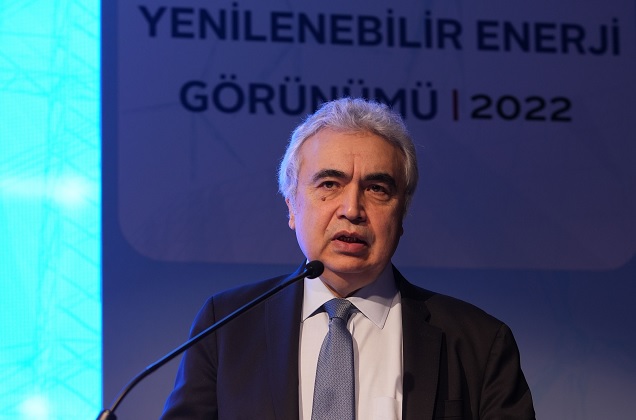
“Global energy crisis will affect developing countries, Europe and Russia”
Developing countries; the number 1 victim of the current global energy crisis in the coming years will be the economies of these countries. The second is Europe. When this crisis is over, Europe, especially the big countries that are the driving force of the continent, will have to sit down and make a self-criticism about energy; “Why have we depended on a single country for most of our energy for decades?” We conduct an energy review and prepare a report every five years in Europe. One of the last recommendations we made was “diversify your energy imports and don't be dependent on a single country”. Now Europe is paying the price for not following this recommendation. As of now, Europe seems to be able to pass this winter. I think the main problem will be the winter of 2023-2024. And the third one is Russia. Russia was one of the cornerstones of the world energy system. Revenues from energy exports are extremely important for the Russian economy. Until February 24, 55 percent of Russia's total oil exports and 65 percent of its total natural gas exports were going to Europe. Europe was a very good customer that paid on time. Russia lost its biggest customer day by day. It is very difficult for Russia to find new markets to replace Europe. It will face a serious problem and significant loss of revenue. It is possible to say that in the field of energy, the role of Russia, which played a very important role on February 24, will change on a world scale and will become a different role. Therefore, we can say that the global energy crisis does not bring good things for all three regions.
“There is a tremendous development in renewable energy in the world today”
The second question is, “Will this crisis accelerate or decelerate the transition to clean energy?” Our findings are that the current global energy crisis will accelerate the transition to clean and safe energy technologies. We can look at a few reasons for this. First, many countries have issued emergency programs, financial and legal programs, and accelerated clean and safe energy technologies in their own countries. There is a tremendous development in renewable energy in the world today. In the next five years, the world's renewable energy capacity will increase by 2400 GigaWatts. This increase corresponds to the increase the world has achieved in the last 20 years. We see a rapid increase in solar and wind, especially all over the world. There is also a significant increase in energy efficiency. This year, the increase in energy efficiency was twice the average increase in other years. The reason for this is again both the incentives introduced and the steps taken by the governments in this area. Third; electric cars. While 4 out of every 100 cars sold in the world in 2019 were electric, approximately 15 of every 100 cars sold in the world today are electric. According to our estimates, one of every two cars sold in the world's three largest markets America, China and Europe by 2030 will be electric.
“2022 will be a year in which clean energy technologies will gain historical momentum”
Another indicator is the acceleration in clean energy. Likewise, there is a serious and very rapid return to nuclear in the world right now. In other words, governments’ response to the global energy crisis will, in our estimation, accelerate the transition to clean and reliable energy technology. There are three reasons for this. The first is energy security, the second is industrial policies, and the third is developments related to climate change.
The year 2022 has been extremely painful for many people, especially those living in Ukraine. When we look at today in 2030, we will not only remember 2022 as a difficult and painful year, but also as a year in which clean energy technologies gained historical momentum”.
“We think that renewable energy in Turkey will grow by 65% in 5 years”
In response to a question, Dr. Fatih Birol stated that Turkey has made a huge leap in the field of renewable energy and said, “We, at the IEA, think that the renewable energy in Turkey will grow by two-thirds, that is, close to 65 percent, in the next 5 years. In terms of growth, this means being among the top 4 in Europe and the top 10 in the world. Our potential is huge. Solar, wind, geothermal, hydroelectric… I hope Turkey can get out of this crisis by increasing its renewable energy even more”.
“Turkey can gain ten units of economic contribution from one unit of investment in renewable energy”
At the conference, the launch presentation of the “Turkey Renewable Energy Outlook 2022 Report” prepared by IICEC, a first in the industry, was made by Bora Şekip Güray, IICEC Director. Bora Şekip Güray underlined that in the study they prepared, they presented 7 strong concrete proposals about renewable energy to all stakeholders and continued as follows:
“According to IICEC's 'Turkey Renewable Energy Outlook' study, the proportional contribution of renewable energy in Turkey's electricity generation may increase by two times, and the contribution of renewable energy in the total energy system may increase more than four times until 2050. In the High Scenario, nearly 90% of electricity generation can be met from renewable energy in 2050. While the fastest growth is in solar and wind, the contribution of these two sources to electricity production will reach two-thirds in 2050 with a proportional increase of four times. In the IICEC analysis, while the weight of fossil fuels is greatly reduced, this development offers critical gains to Turkey's energy economy and environmental performance.
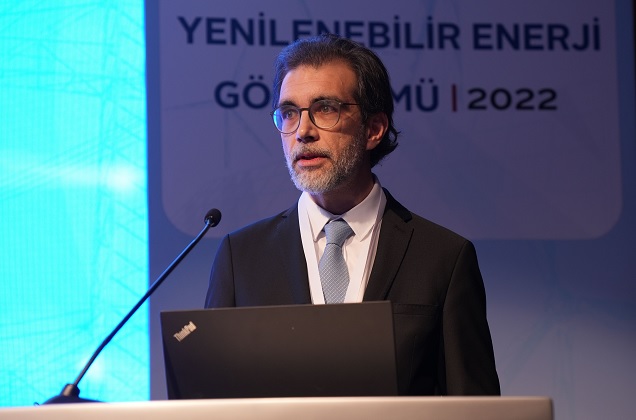
Investments to be made, especially for a renewable energy-oriented and efficient electricity system, will greatly reduce Turkey's fossil fuel imports and emissions inventory. This will be the most important supporter of a safer and cleaner energy future. One unit of electricity investment increase will create ten units of savings in imported fossil fuel and emission costs. To support efficient and strong growth in renewable energy, development will be critical in market, investment climate, finance, networks, technology and strategic objectives. IICEC 'Turkey Renewable Energy Outlook' presents 7 concrete suggestions to all stakeholders, including the human resource development focus, to utilize Turkey's high growth potential in renewable energy and related technologies, which offers multidimensional opportunities for energy security, clean energy transformation, competitive and technology-oriented industrial development:
- Reaching a total renewable energy installed power of more than 250 GW and a renewable electricity generation share of more than 85% and a total renewable energy share of 50% in final energy demand by 2050, and determining roadmaps on the basis of resources, technologies, and sectors.
- Developing sustainable investment and financing models for an efficient, in-depth, cost-reflective, predictable electricity market operation, thus ensuring strong growth in the project stock.
- Strengthening the capacity and flexibility of the networks, which form the backbone of the electricity system, with technology-oriented investments supported by long-term dynamic planning.
- Continuing the development of wind and solar technology in a way that supports the sustainability of supply chains and Turkey being a regional clean energy technologies production base, and implementing developments in energy storage and green hydrogen production technologies.
- Promoting energy security and the clean energy transition by ensuring that direct renewable energy contribution is increased at least threefold in addition to clean electrification in buildings, industry, transportation, and other energy-consuming sectors.
- Transforming growth in renewable energy ecosystems into high value-added opportunities by leveraging the energy efficiency potential and digitalization solutions in the value chain.
- Developing qualified human resources and entrepreneurial ecosystems that will support strong and sustainable growth and competitiveness in renewable energy.
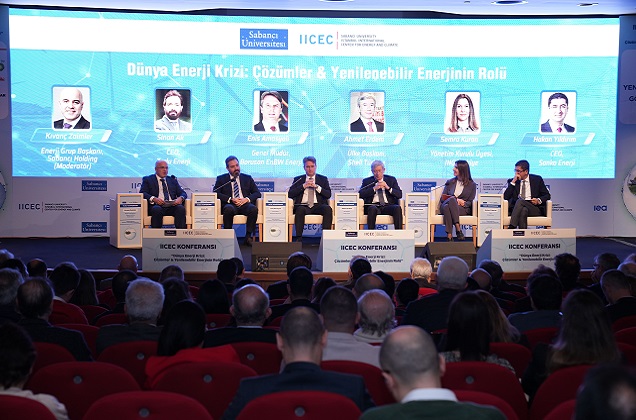
PANEL
The energy crisis and the importance of renewable energy were evaluated in terms of the sector and companies.
In the panel during the conference moderated by Sabancı Holding Energy Group President Kıvanç Zaimler, the energy crisis in the world and the latest developments in the field of renewable energy were evaluated. Zorlu Enerji CEO Sinan Ak, Borusan EnBW Enerji General Manager Enis Amasyalı, Shell Turkey Country Chair Ahmet Erdem, ING Turkey Board Member Semra Kuran, and Sanko Enerji Group CEO Hakan Yıldırım took part in the panel as speakers.
“Crises bring opportunities”
Sabancı Holding Energy Group President Kıvanç Zaimler:
“The IICEC report was prepared from an analytical perspective. Today, while the energy transformation agenda is advancing rapidly, there is, on the other hand, the Russia-Ukraine War as well as the energy security debates in Europe and record energy prices. Crises bring opportunities. In world wars, the world's greatest innovations and innovations emerge. The environment created by the Russia-Ukraine War also made significant contributions to the development of clean and reliable energy. I hope that the economy of clean and reliable energy technologies can reach reasonable levels thanks to the benefits of competition”.
“Turkish investors are extremely positive and eager for energy”
Zorlu Enerji CEO Sinan Ak:
“It is obvious that change and transformation cannot happen in one day in order to prevent the crisis in energy. A long time is needed for the establishment of renewable energy facilities, the sustainable mining required for battery and storage systems, and the establishment of the facilities. When we look at Turkish investors in the field of energy, they are extremely positive and eager. However, we see that investing and competing in Europe is more expensive and more difficult compared to the Middle East. We see this in our charging station investments in Europe. I think that in addition to their investments in our country Turkish investors should turn their route to the Middle East, India, and America considering the opportunities and incentives in the field of renewable energy. I also attach great importance to the Black Sea gas discovered in our country. I think Turkey will have an advantage in every sense when it reaches the above-mentioned levels”.
“We are witnessing the birth of a new energy economy”
Borusan EnBW Enerji General Manager Enis Amasyalı:
"Today, in the midst of the climate crisis and the energy crisis, we are witnessing a major energy transformation, the birth of a new energy economy. In the past, energy conversion cycles were experienced with great turmoil, from biofuels to coal, from coal to oil, with the use of fuels being added together. The climate crisis, on the other hand, has put the whole world in a process in which some resources need to be removed from the equation. Climate and energy crises are interconnected, and we must respond quickly to both. The right investment decisions to be made today will be historical milestones for a clean and safe energy future that is affordable for consumers. At this turning point, we see that the decisions taken in the midst of the energy crisis have greatly accelerated the clean energy transformation.
The energy policy of our country within the framework of energy supply security, affordable energy supply, and 2053 net zero target aims to make maximum use of renewable energy sources and energy efficiency potentials. The 2053 net zero target and the Border Carbon Regulation within the framework of the Green Deal are important factors that will accelerate our country's transformation to clean energy. We are lucky in terms of renewable energy potential, but we are currently tapping only a small part of this potential. Predictable, sustainable investment and finance mechanisms that will bring the lawmakers, financial institutions, and investors together for the common benefit will play a vital role in realizing this potential”.
“400 Shell stations have been determined for TOGG's electric vehicles”
Shell Turkey Country Chair Ahmet Erdem:
“I find predictable and efficient energy market development critical. In 2022, war and human tragedy, energy security risks, climate change concerns, rapidly rising energy prices, global inflation, and recession expectations were on the agenda. Under these conditions, energy transformation will continue, and renewable, zero and low-carbon energy investments will even accelerate. As energy systems change around the world, Shell is playing a leading role. At Shell, our goal is to be a net zero emissions energy business by 2050. Today we are one of the world's largest producers of biofuels and have 10% of the global electrolyzer capacity for hydrogen production. We aim to sell approximately 560 Terawat-hours of electricity per year by 2030. We have increased our electric vehicle charging network from approximately 60,000 in 2020 to approximately 90,000 at the end of 2021. We aim to increase it to over 500,000 by 2025 and to 2.5 million by 2030.
At Shell Turkey, while trying to reduce our carbon footprint with efficiency, savings, renewable energy use, and solar panel investments in our own activities, we also aim to offer products with zero or low carbon intensity to our customers. At Shell & Turcas, we have signed a cooperation with Trugo company, which offers electric vehicle charging solutions to Turkey's electric car TOGG, in order to provide an uninterrupted experience to electric vehicle users. As Trugo and Shell & Turcas, we will work together to serve all electric vehicle users with chargers over 180 kWh in 81 provinces. 400 Shell stations have already been determined for this purpose”.
“We are moving towards our net zero targets for 2050 with innovative solutions”
ING Turkey Board Member Semra Kuran:
“Energy plays a critical role in solving the global problems we face today. In this period, where investments for a net zero world are expected to increase by more than 50 percent, renewable energy investments will take the largest share. In this respect, it is of strategic importance for financial institutions to develop green financing instruments, provide consultancy to their customers, and establish the necessary frameworks and standards in order to ensure that these investments are realized with a focus on sustainability. At ING, an institution that has been leading the sustainability movement since the 1990s, we are moving towards our net zero targets for 2050 with innovative solutions in this field. While minimizing the effects of our own operations, we also develop products, services, solutions, and standards that play a role in helping our customers and business partners achieve their sustainability goals. At the same time, we attach importance to raising awareness of the societies in which we live. In this context, we strengthen our work through collaborations and memberships with national and international platforms. As a reflection of this, we find our cooperation with IICEC very valuable as it strengthens our own climate action efforts and serves social, economic, and environmental transformation”.
“Turkey has made considerable leaps in the last 15 years, especially in wind and solar energy”
Sanko Enerji Group CEO Hakan Yıldırım:
“As Turkey, we need to focus on what kind of roadmap we should follow in renewable energy technologies. Today, there are very important issues that both excite and preoccupy the energy sector in our country. Undoubtedly, the biggest concern of the industry is uncertainty. However, there are also exciting topics. One of the most exciting topics, especially after the Russia-Ukraine war, is the understanding of the strategic importance of renewable energy in a way that will never be forgotten again. Therefore, it is a fact that we will experience processes where the efficiency of technology increases and the cost decreases. The developments to be experienced in the fields of electric storage and hydrogen, especially solar energy, arouse great excitement throughout the sector.
Turkey has made considerable leaps in the field of renewable energy, especially in wind and solar fields, especially in the last 15 years. Today, 55-60% of wind turbines can be manufactured locally. There is a local manufacturing capability from the raw material, namely polysilicon, in the field of solar energy. There is also local module manufacturing capability in the battery business, and now the companies that will manufacture cells have started their investments. We need to support this manufacturing power. We must create local demand. There is a need for steps that can pave the way for the sector. Companies will make new developments, cheapen their production and be competitive in global markets with what they earn from the local market”.




